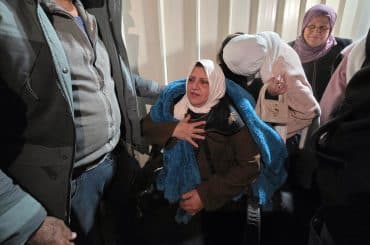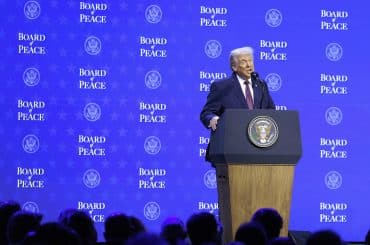
(Image: Carlos Latuff)
Among informed and honest observers, there is no dispute that Israel is imposing a separate and grossly unequal system of ethnic discrimination on the Palestinians, most blatantly in the Occupied Palestinian Territories (OPT). Setting aside the complex system of discrimination within Israel itself, one cannot look at the separate road systems in the OPT, the unequal distribution of water, the systematic denial of Palestinian building permits while Israel expands illegal settlements, and so on, and fail to see that that this is, indeed and by definition, apartheid.
But there remains a dispute over the political and rhetorical utility of using the word “apartheid” to describe the system imposed by Israel on Palestinians in the OPT. When Jeffery Goldberg asked former U.S. Special Envoy to the Middle East George Mitchell if he believed “apartheid-like conditions prevail” in the West Bank, Mitchell replied:
The issue and conflict is complex enough without the use of inflammatory words and phrases whose only result, I won’t say intention in every case, is to create aggravation and hostility. If you can say something two ways, and one way is bound to antagonize your opponent, and the other way can get your point across without antagonizing your opponent, why do you choose the inflammatory way if you really do want to accommodate their concerns and reach an agreement?
Here, Mitchell clearly acknowledges that the West Bank is ruled by Israel under apartheid-like conditions, but wants to steer clear of using the term because it is “inflammatory,” and is said to aggravate rather than help resolve the conflict. In a recent article, Hussein Ibish of the American Task Force on Palestine (ATFP) took a similar position, describing “apartheid” as a “conversation stopper” in the United States. Because Americans do not know what life under occupation is like for Palestinians, he argues, when hearing the charge of apartheid they will “simply assume that they are being exposed to hyperbolic anti-Israel propaganda and stop listening before they hear the facts.”
He goes on to say:
It is infinitely more powerful to show rather than tell. Rather than leading with an announcement that Israel practices apartheid, it is much more effective to simply describe the realities: Every aspect of daily life in the occupied Palestinian territories for every individual is defined by whether the Israeli government categorizes them as an Israeli settler, and therefore a citizen of the state with all the rights and responsibilities accruing to citizenship, or a Palestinian noncitizen living under occupation. If you simply describe life under occupation, audiences will draw their own parallels between the occupation and apartheid in South Africa or Jim Crow laws in the segregationist American south.
While Ibish’s and Mitchell’s concerns are valid, they are hardly sufficient grounds to abandon the use of the term apartheid. This is indeed an inflammatory word, but one which accurately describes an inflammatory, intolerable and unsustainable reality. It is also true that it is of course, when possible, preferable to thoroughly describe Israel’s utterly discriminatory treatment of Palestinians. But in the media world of sound bites, and limited opportunities to grab people’s attention, there is typically not the time to explain these details.
In response to Israel’s false buzzwords that claim it stands for “freedom,” “peace,” and “democracy,” Palestinians are in need of compelling and truthful keywords that encapsulate life under Israeli rule, like “occupation” and “apartheid.” If using shorthand for describing Israel’s oppression of the Palestinians is really a “conversation stopper,” then we need to work on changing that by making the case for such terms, not abandoning them.
Furthermore, many academic institutions divested from South Africa during the apartheid era, and some of them still have policies that forbid investing in any system of “apartheid.” If Israel’s policies in the OPT become widely and correctly identified as apartheid, then the potential increases dramatically for spreading the Boycott, Divestment, and Sanctions (BDS) campaign that’s aimed at ending Israel’s occupation of Palestine further into mainstream American discourse.
Recently, Rep. Joe Walsh (R-IL) recommended resolving the Israeli-Palestinian conflict by creating a single state in which Palestinians would have “limited voting power” (imagine how he would react if anyone suggested his own ethnic group be denied full voting rights). With American politicians now officially recommending what can only be described as apartheid as a long-term “solution” for Israel and the Palestinians, it is rather important to be blunt about what that exactly means.
For all these reasons, our task is to mainstream the term “apartheid” in describing the reality in Israeli-occupied Palestine. This job is half-done for us already by former American president Jimmy Carter, who wrote a book called Palestine: Peace Not Apartheid. Being categorically assertive in describing the ongoing injustice in Palestine in simple, straightforward terms is an essential component in our effort to end that injustice.



The International Legal study funded and co-ordinated by the Government of South Africa, found that the practices of Israel in the West Bank including East Jerusalem and the Gaza strip constitute both Colonialism and Apartheid
Also The Russell Tribunal last year found that Israel practiced Apartheid, so we have considered legal opinions from respected jurists all saying the same thing, many South African leaders who knew Apartheid in South Africa, say that Israels is worse, The Apartheid regime in South Africa at least wanted black South Africans as cheap labour, whereas the Israelis just want the Palestinians to disappear, the method they have chosen is ethnic cleansing bordering on genocide. So when confronted with a “conversation stopper” just refer to the opinions above.
Yes, use it.
Palestines are dying from all of this ‘non inflammatory’ rhetoric mincing and truth aversion disease.
Accommodating minorities that grow in size in the political system is often tricky.
One approach of dealing with minorities is to give them token positions. For example, for decades the post of Minister of Tourism in Israel was reserved for total idiots. However, with growing numbers and political activity of that demographic group it was necessary to create more and more special ministerial posts, some “without portfolio”, some with vague portfolios like “strategic affairs”, and finally they got a decisive majority (still keeping Tourism).
One can see that Israeli model must be very attractive to Rep. Joe Walsh. He is not your run of the mill idiot. I checked his op-ed, and the fuller quote is “Those Palestinians who remain behind in Israel [the est would be “raptured” to Jordan] will maintain limited voting power but will be awarded all the economic and civil rights of Israeli citizens. They will be free to raise families, start businesses and live in peace, all of which are impossible under current Arab rule.”
(1) current Arab rule ?!?! aren’t they currently under a non-Arab rule? or he means “rules for Arabs”?
(2) so under the current rule (Arab? for Arabs?) the Palestinians are not free to “start business” or “raise families” or “leave in peace”.
I wonder what “limited voting rights” would entail: voting for PTO representatives?
Walsh opus is so mediocre that one can see that he proudly rejected any help penning it. And he was published in a big city newspaper. Are non-idiots reduced to a minority in one more country?
A South African think tank did a detailed study of the two sets of laws governing Israelis and Palestinians in the territories and concluded that Israel is indeed practicing apartheid. See http://icahdusa.org/store/is-israel-an-apartheid-state/ where you can order or download a condensed version of the study. Also, see this website: http://itisapartheid.org/further.html which has the Russell Tribunal’s conclusion that Israel is practicing apartheid. Apartheid is a crime against humanity, as opposed to discrimination. Hence, terminology makes a difference.
Miko Peled made a very good point when I heard him speak. Those who try to argue that apartheid is only taking place in the OT, and that this means Israel itself is not apartheid, are kidding themselves.
As he says, look at any Israeli map and it designates all of Palestine as Israel. Therefore it is irrelevant whether apartheid strictly only applied to the OT or Israel proper – it’s all Israeli policy in the end.